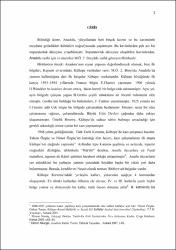| dc.contributor.advisor | Memiş, Ekrem | |
| dc.contributor.author | Taşdöner, Kevser | |
| dc.date.accessioned | 2015-03-27T13:09:20Z | |
| dc.date.available | 2015-03-27T13:09:20Z | |
| dc.date.issued | 2005 | |
| dc.date.submitted | 2005 | |
| dc.identifier.uri | http://hdl.handle.net/11630/3502 | |
| dc.description.abstract | M.Ö. 2. Binyılda Anadolu’da büyük bir siyasi güç haline gelen Hitit Devleti, kabileler halinde yaşayan barbar bir kavmin tehlikesi altındaydı. Bu kavim, Anadolu’nun kuzey bölgesinde yaşayan Gaşkalar’dı. Hitit Devleti hemen hemen ilk zamanlarından yıkılışına kadar, Gaşkalar’la mücadele etmek zorunda kalmıştır.
Gaşkalar hakkında en tatmin edici bilgileri Hitit kaynaklarından öğreniyoruz. Bunun yanında, Mısır ve Asur devletlerinin politik kaynaklarında da Gaşkalar’dan söz edildiğini görebiliyoruz.
Hitit Devleti’nin hemen her kralı Gaşkalar üzerine sefer düzenlemiştir. Bundan dolayı, Hititler’e ait birçok vesika Gaşkalar’dan bahsetmektedir. II. Tuthalya’nın Yıllıkları, I. Šuppiluliuma’nın Kahramanlıkları Metni, II. Muršili’nin Yıllıkları ve III. Hattušili’nin Otobiyografisi, Gaşkalar hakkında son derece önemli bilgiler vermektedir. Aynı zamanda, Hititler’in diğer Anadolu krallıkları ile yaptıkları antlaşmalarda da Gaşkalar’ın ismi geçmektedir.
Gaşkalar, Hitit tarihinde ilk kez Eski Krallık Dönemi’nde ortaya çıkmışlardır. Fakat, onlardan bahseden ilk en ayrıntılı belge Yeni Krallık Dönemi krallarından, I.Arnuvanda ve Kraliçe Ašmunikal’e ait dua metinleridir.
Gaşkalar, birbirlerinden bağımsız kabileler halinde yaşıyorlardı ve her kabilenin ayrı bir reisi vardı. Anlaşılacağı gibi, merkezî bir otorite söz konusu değildi. Bu sebepten dolayı, Hitit Devleti hiçbir zaman bu halkı hâkimiyeti altına alamamıştır. Aniden baskınlar düzenleyen bu savaşçı halk, artık Hitit Devleti için bir dış politika haline gelmiştir ve Hitit tahtına geçen her yeni kralın çözümlemesi gereken sorun olmuştur. Ege Göçleri ile yıkılan Hitit Devleti, son zamanlarına kadar Gaşkalar’la mücadelesine devam etmiştir. Bir taraftan göçle gelen kavimlerle savaşan Hititler, bir taraftan da Gaşkalar’la mücadelesini devam ettirmiştir. Bu sebeple, kuvvetleri bölünmüş ve aynı zamanda oldukça yıpranmıştır. Hitit Devleti’nin en zayıf anlarında saldıran Gaşkalar, M.Ö. 2. Binyılın en güçlü devletinin yıkılmasında etkili olmuşlardır. | en_US |
| dc.description.abstract | The State of Hittites, which was a great political power in Anatolia in 2. Millenium B.C., was under the threat of a barbaric nation that was living in tribes at the time. These were the Kaskas, which had settled in North Anatolia.
Hittites had to struggle with the Kaskas from the earlier time their establishment until they fell down. We get the most accurate an reliable information about the Kaskas from Hittites sources. It is also known to us that the Kaskas are mentioned in Egyptian and Assyrian political resources.
Almost every king of the Hittites is known to have attacked on the Kaskas. For this reason, many documents that belong to the Hittite refer to the Kaskas. The almanacs of Tuthalya II., heroism texts of Suppililiuma I., the almanacs of Mursili II. and the autobiograpy of Hattusili III. give information of great significance about the Kaskas. In addition, the Kaskas name is also referred to in agrrements the Hittite made with other Anatolian kingdoms.
The Kaskas first appeared in the Hittite history during the Ancient Kingdom Era. However, the first and mos detailed document that referred to the Kaskas is the prayer texts that belonged to King Arnuvanda I. and Queen Asmunikal of the New Kingdom Period.
The Kaskas lived in tribes independent of each other, and each tribe had its own Chief. As should be inferred, no central authority authority was in question. For this reason, the were never able to dominate that nation. This warlike nation, having raided over the Hittite unexpectelly, became part of their foreign policy and a problem necessary to solve for every king newly throned. The State of Hittite, which came down under the effect of the Aegean Immigrations, continued their struggle until the last moment. While, on the one land, they were fighting against the immigrant nations, the Hittite had to continue their struggle with the Kaskas, on the other hand. Therefore, their forces were broken into pieces and were worn out. The Kaskas caused the Hittite, the most powerful state of the 2. millenium B.C., to fall down by attacking them when they were most weakened. | en_US |
| dc.language.iso | tur | en_US |
| dc.publisher | Afyon Kocatepe Üniversitesi, Sosyal Bilimler Enstitüsü | en_US |
| dc.rights | info:eu-repo/semantics/openAccess | en_US |
| dc.subject | Gaşkalar | en_US |
| dc.subject | Hititler | en_US |
| dc.subject | Ege Göçleri | en_US |
| dc.title | Hititler'in Tarihinde Gaşkala'rın Rolü ve Önemi | en_US |
| dc.title.alternative | Gaşkala'r The Role and Importance of History of the Hittites | en_US |
| dc.type | masterThesis | en_US |
| dc.department | Afyon Kocatepe Üniversitesi, Sosyal Bilimler Enstitüsü, Tarih Anabilim Dalı | en_US |
| dc.relation.publicationcategory | Tez | en_US |



















